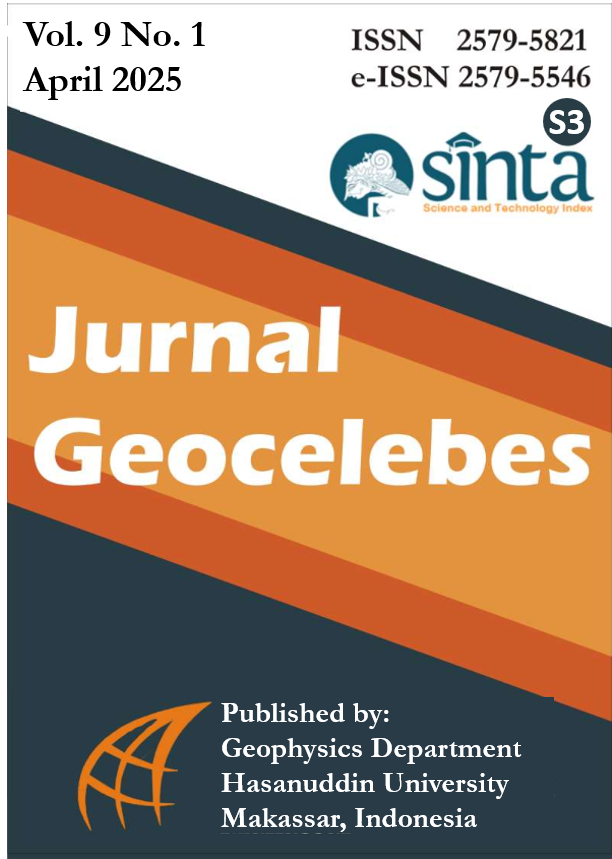Mapping of Soil Stability based on Shear Wave Velocity Values (Vs30) Using the Multichannel Analysis Surface Wave (MASW) Method on Kalimantan Highway, Rawa Makmur Village, Bengkulu City
DOI:
https://doi.org/10.70561/geocelebes.v9i1.34956Keywords:
Bengkulu, Multichannel Analysis Surface Wave, Shear Wave Velocity, SubsoilAbstract
Kalimantan Highway in Bengkulu is a heavily traveled route and the main gateway to Bengkulu City from northern areas such as Arga Makmur and Ketahun sub-district, or Mukomuko regency also surrounding areas. Geological formations in the form of alluvium terraces (Qat) cause soil instability, often damaging the road surface. These include the formation of potholes and the occurrence of puddles during heavy rains. This research aims to determine the bearing capacity (stability) of the soil layer along Kalimantan Highway section in Rawa Makmur Village, Muara Bangkahulu District, and provide planning information through mapping. It is imperative to assess the condition of the soil layer. This research uses geophysical methods, specifically the Multichannel Analysis of Surface Wave (MASW) technique, using a MASW PASI 16S24-P digital seismograph to image subsurface soil conditions by analyzing shear wave velocity (Vs). A total of 20 data points were collected along the Kalimantan Highway section. The results of the Vs profile analysis were interpreted into soil classifications based on the criteria set out in SNI 1726:2019. The majority of the road sections were classified as SE (soft soil) and SD (medium soil), with some points designated as SC (hard soil/soft rock). This indicates that the geotechnical design for these road sections should consider supporting factors to maintain structural safety and stability.
References
Al Ansory, A. R., Raihana, H., Farid, M., & Hadi, A. I. (2024). Investigation of Sediment Layer Thickness Estimation at Bengkulu University Hospital Based on Microtremor Data. Jurnal Geocelebes, 8(1), 1–10. https://doi.org/10.20956/geocelebes.v8i1.28144
Ardianto. (2018). Pemetaan Kecepatan Gelombang Geser (Vs30) Metode Multichannel Analysis of Surface Wave untuk Zonasi Amplifikasi Gempa Wilayah Surabaya Bagian Timur. ITS.
Building Seismic Safety Council -BSSC. (2003). NEHRP Recommended Provisions for Seismic Regulations for New Buildings and Other Structures (FEMA 450). Part 1, Fema 450, 338.
Budianto, G., Sinaga, J. E. E., Pritama, V. L., Suhendra., & Halauddin. (2023). Potensi genangan banjir berdasarkan nilai porositas dan resistivitas batuan di kecamatan muara bangkahulu, kota bengkulu. Wahana Fisika, 8(1), 76–90. https://doi.org/10.17509/wafi.v8i1.57874
Bustari, A. A., & Wibowo, N. B. (2023). Pemetaan sebaran nilai Vs30, faktor amplifikasi tanah, dan peak ground acceleration wilayah Bantul timur. Cakrawala Jurnal Ilmiah Bidang Sains, 1(2), 73–80. https://doi.org/10.28989/cakrawala.v1i2.1436
Butzer, K. W., Helgren, D. M., Fock, G. J., & Stuckenrath, R. (1973). Alluvial Terraces of ohe Lower Vaal River, South Africa: A Reappraisal And Reinvestigation. The Journal of Geology, 81(3), 341–362. https://doi.org/10.1086/627875
Dewi, N. A., Tohari, A., & Muttaqien, I. (2020). Evaluasi Potensi Likuifaksi Di Wilayah Cekungan Bandung Berdasarkan Metode Analisis Multi-Sensor Gelombang Permukaan. RISET Geologi Dan Pertambangan, 30(2), 241–256. https://jrisetgeotam.lipi.go.id/index.php/jrisgeotam/article/view/1131
El Oshebi, F. M., Shaltami, O. R., Fares, F. F., Al Barghathi, J. A., El Ogali, M., Errishi, H., & Badi, A. M. (2020). Alluvial Terraces As a Measure of Vertical Movements and Neotectonics: Evidences From Wadi Sidi Moussa, Cyrenaica, NE Libya. EPH - International Journal of Applied Science, 6(3), 25–32. https://doi.org/10.53555/eijas.v6i3.96
Hadi, A. I., Refrizon, R., Halauddin, H., Lidiawati, L., & Edo, P. (2021). Interpretasi Tingkat Kekerasan Batuan Bawah Permukaan di Daerah Rawan Gempa Bumi Kota Bengkulu. Indonesian Journal of Applied Physics, 11(1), 11–24. https://doi.org/10.13057/ijap.v11i1.46525
Hasya, C. A., Khaizal, K., & Irwandi, I. (2021). Perbandingan Metode Multichannel Analysis of Surface Wave dan Metode Cone Penetration Test Terhadap Analisis Lapisan Tanah. Journal of The Civil Engineering Student, 3(1), 8–14. https://doi.org/10.24815/journalces.v3i1.12265
Kementerian Pekerjaan Umum dan Perumahan Rakyat. (2016). Spesifikasi Pekerjaan Tanah.
Lantu, L., Aswad, S., Fitriani, F., & Marjiyono, M. (2018). Pemetaan Wilayah Rawan Bencana Gempabumi Berdasarkan Data Mikrotremor Dan Data Bor. Jurnal Geocelebes, 2(1), 20–30. https://doi.org/10.20956/geocelebes.v2i1.3721
Lin, C.-P., Chang, C.-C., & Chang, T.-S. (2004). The use of MASW method in the assessment of soil liquefaction potential. Soil Dynamics and Earthquake Engineering, 24(9–10), 689–698. https://doi.org/10.1016/j.soildyn.2004.06.012
Lubis, A. M., Saputra, A., Suhendra, S., Saputra, R., & Samdara, R. (2021). Penentuan Ketebalan Sedimen pada Segmen Kumering, Sesar Sumatra di Daerah Liwa Lampung Barat dengan Menggunakan Metode Seismik Aktif MASW. Jurnal Lingkungan Dan Bencana Geologi, 12(3), 137–147. https://doi.org/10.34126/jlbg.v12i3.334
Mase, L. Z., Sugianto, N., & Refrizon. (2021). Seismic hazard microzonation of Bengkulu City, Indonesia. Geoenvironmental Disasters, 8(5), 1–17. https://doi.org/10.1186/s40677-021-00178-y
Mufardis, A., Khaizal, K., & Irwandi, I. (2023). Pemetaan Vs30 dan Analisis Potensi Likuifaksi Berdasarkan Vs Menggunakan Metode MASW di Kecamatan Banda Raya dan Jaya Baru Kota Banda Aceh. Journal of The Civil Engineering Student, 5(2), 162–168. https://doi.org/10.24815/journalces.v5i2.20992
Muzli, M., Mahesworo, R. P., Madijono, R., Siswoyo, S., Pramono, S., Dewi, K. R., Budiarta, B., Sativa, O., Sulistyo, B., Swastikarani, R., Oktavia, N., Moehajirin, M., Efendi, N., Wijaya, T. A., Subadyo, B., Mujianto, M., Suwarto, S., & Pramono, S. (2016). Pengukuran Vs30 Menggunakan Metode MASW Untuk Wilayah Yogyakarta. Jurnal Meteorologi Dan Geofisika, 17(1), 25–32. https://doi.org/10.31172/jmg.v17i1.374
Nofirman. (2016). Interpretasi Satuan Litologi, Satuan Bentuk Lahan, dan Struktur Geologi dengan Integrasi Citra SRTM Di Wilayah Kota Bengkulu. Jurnal Geografflesia, 1(2), 27–37.
Ólafsdóttir, E. Á., Erlingsson, S., & Bessason, B. (2017). Tool for analysis of MASW field data and evaluation of shear wave velocity profiles of soils. Canadian Geotechnical Journal, 55(2), 217–233. https://doi.org/10.1139/cgj-2016-0302.
Oldknow, C. J., & Hooke, J. M. (2017). Alluvial terrace development and changing landscape connectivity in the Great Karoo, South Africa. Insights from the Wilgerbosch River catchment, Sneeuberg. Geomorphology, 288, 12–38. https://doi.org/10.1016/j.geomorph.2017.03.009
Park, C. B., Miller, R. D., & Xia, J. (1999). Multichannel analysis of surface waves. Geophysics, 64(3), 800–808. https://doi.org/10.1190/1.1444590
Prasisila, M., Refrizon., & Hadi, A. I. (2021). Klasifikasi Kelas Situs Tanah dengan Nilai Vs30 di Kecamatan Muara Bangkahulu Kota Bengkulu menggunakan Metode Multichannel Analysis of Surface Wave (MASW). Prosiding Seminar Nasional Fisika, 7.0, 277–282. http://proceedings.upi.edu/index.php/sinafi/article/view/1843/1644
Rosyidi, S. A. P. (2015). Pemetaan Daya Dukung Tanah Dan Diskontinuitas Struktur Tanah Dasar Menggunakan Metode Multi- Channel Analysis of Surface Waves (MASW). Seminar Nasional Teknik Sipil V Tahun 2015 -UMS, G-161–G-169. https://publikasiilmiah.ums.ac.id/handle/11617/6427
Sugianto, N., Farid, M., & Suhendra, S. (2017). Kondisi Geologi Lokal Kota Bengkulu Berdasarkan Ground Shear Strain (GSS). Spektra: Jurnal Fisika Dan Aplikasinya, 2(1), 29–36. https://doi.org/10.21009/spektra.021.05
Suhono, T., & Al Fatta, H. (2021). Penyusunan Data Primer sebagai Dasar Interoperabilitas Sistem Informasi pada Pemerintah Daerah menggunakan Diagram RACI (Studi Kasus: Pemerintah Kabupaten Purworejo). Jnanaloka, 2(1), 35–44. https://doi.org/10.36802/jnanaloka.2021.v2-no1-35-44
Suparno., Feriska, Y., Pramono, H., Khamid, A., & Apriliano, D. D. (2023). Analisa Kerusakan Jalan Kabupaten Ruas Klampok – PG Banjaratma Kabupaten Brebes. Journal of Science, Engineering and Information Systems Research, 1(1), 10–18. https://jurnal.eraliterasi.com/index.php/erasains/article/view/98/84
Susilanto, P., & Ngadmanto, D. (2015). Analisis Kecepatan Gelombang Geser (Vs) di Cilacap, Jawa Tengah sebagai Upaya Mitigasi Bencana Gempabumi. Jurnal Meteorologi dan Geofisika, 16(1), 57–64. https://doi.org/10.31172/jmg.v16i1.263
Susilanto, P., Ngadmanto, D., Sunardi, B., & Rohadi, S. (2019). Analisis Kecepatan Gelombang Geser (Vs) Sebagai Upaya Mitigasi Bencana Gempabumi di Kulonprogo, DIY. Jurnal Lingkungan Dan Bencana Geologi, 10(2), 41–50. https://doi.org/10.34126/jlbg.v10i2.215
Vikki., Azwar, A., Zulfian., Arman, Y., & Perdhana, R. (2022). Pendugaan Penyebab Keretakan Jalan di Desa Serindang Berdasarkan Interpretasi Data Geolistrik. Jurnal Kumparan Fisika, 5(3), 201–210. https://doi.org/10.33369/jkf.5.3.201-210
Zawawi, A. F., Sunardi, B., & Prayoedhie, S. (2023). Penentuan Klasifikasi Tanah Dengan Menggunakan Metode Multi-channel Analysis of Surface Waves Di Kapanewon Pleret, Kabupaten Bantul. Jurnal Stasiun Geofisika Sleman, 1(2), 01–05. https://jurnal.stageofsleman.id/index.php/jsgs/article/view/6
Downloads
Published
How to Cite
Issue
Section
License
Copyright (c) 2025 JURNAL GEOCELEBES

This work is licensed under a Creative Commons Attribution-NonCommercial-ShareAlike 4.0 International License.
Authors who publish with this journal agree to the following terms:
- Authors retain copyright and grant the journal right of first publication with the work simultaneously licensed under a Creative Commons Attribution License that allows others to share the work with an acknowledgement of the work's authorship and initial publication in this journal.
- Authors are able to enter into separate, additional contractual arrangements for the non-exclusive distribution of the journal's published version of the work (e.g., post it to an institutional repository or publish it in a book), with an acknowledgement of its initial publication in this journal.
- Authors are permitted and encouraged to post their work online (e.g., in institutional repositories or on their website) prior to and during the submission process, as it can lead to productive exchanges, as well as earlier and greater citation of published work (See The Effect of Open Access).





